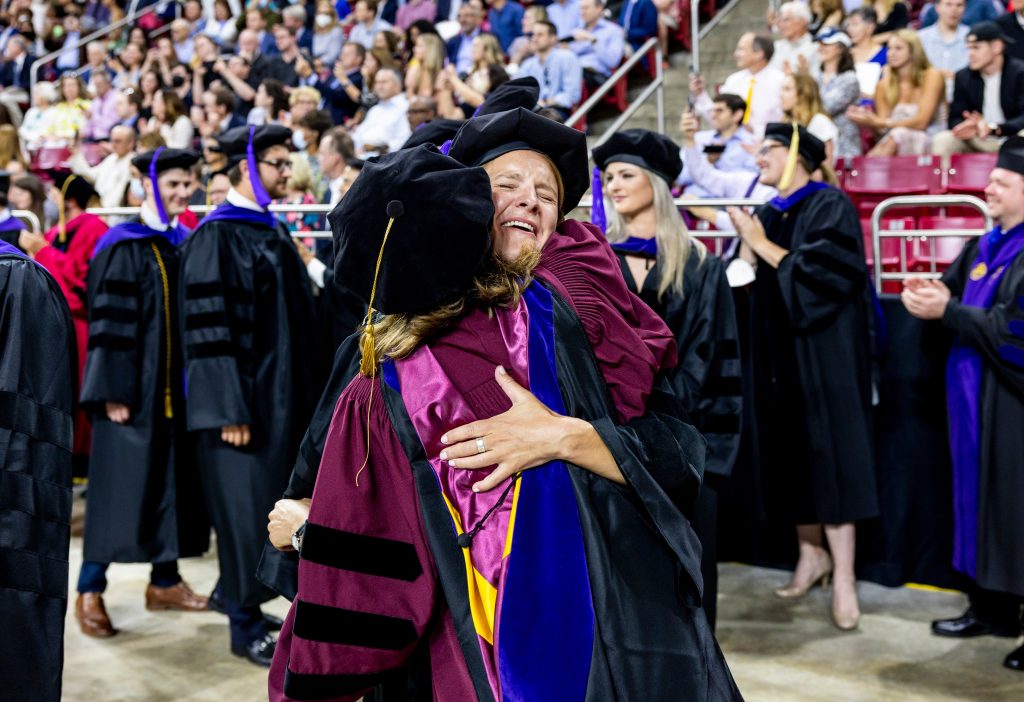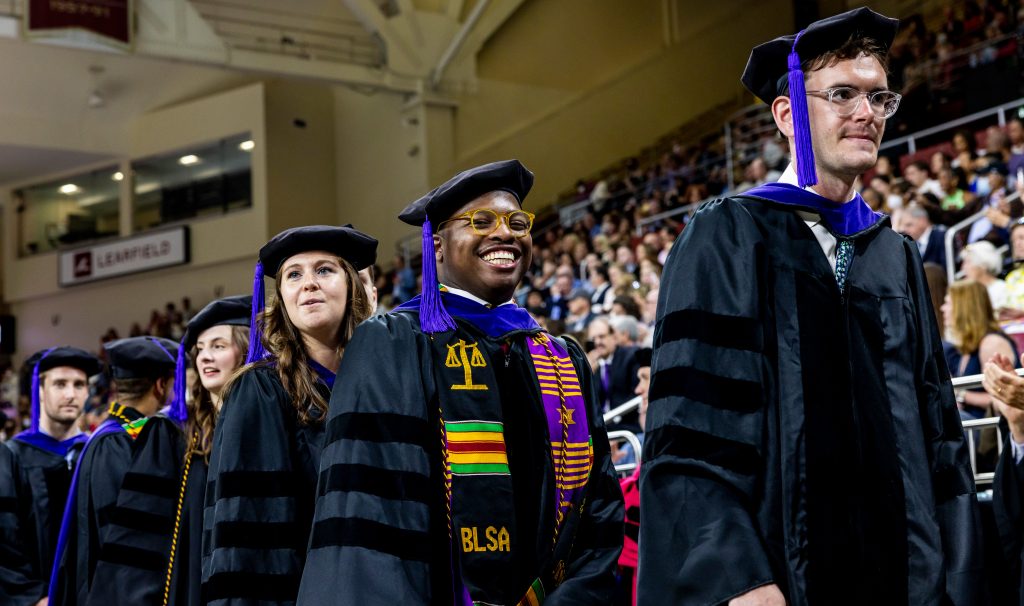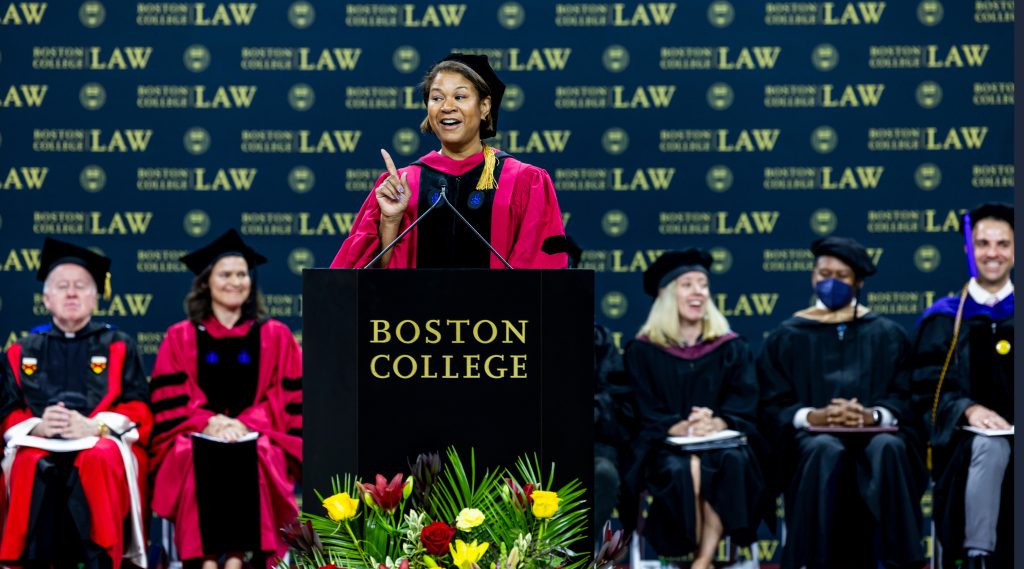Addressing the Boston College Law School Class of 2022, Kimberly S. Budd, Chief Justice of the Massachusetts Supreme Judicial Court, urged the graduates to “stand up and speak out when you see injustice.”
The Chief Justice also told the grads to “look for ways to heal the wounds caused by injustice” to bring people together. “Although many things may divide us, our society is strongest when it rejects hatred and fear and embraces fairness, respect, and equality,” she said.
Chief Justice Budd outlined her career path for the graduates as an example of someone who found her own way. It may seem as if she “had carefully planned it all out,” but nothing could be further from the truth, she said. Her career was a series of steps brought on mainly by the circumstances of her life at the time, she said, and she enjoyed each step along the way to the Massachusetts Supreme Judicial Court, where she became an associate justice in 2016.
“Everything changed in mid-September 2020 when, just six months into the pandemic our Chief Justice [of the SJC], Ralph Gants, died suddenly and unexpectedly,” Chief Justice Budd said. Describing it as “a devastating loss,” and saying that Chief Justice Gants was “irreplaceable,” nevertheless, she said, someone had to attempt to follow in his footsteps. And so she applied, and was approved by Gov. Baker and the Council. “The whole thing was so completely unanticipated, and it all happened so quickly, that it is still sometimes hard for me to believe,” she said.
As only the second Black woman and third African-American overall to be appointed to the SJC, Chief Justice Budd referenced those who came before her as role models and mentors, including the first Black justice on the SJC, Roderick Ireland (later the first Black Chief Justice), and the first Black woman justice on the court, Geraldine Hines. “I realized that, just as they had blazed a trail for someone like me, I could carry on and do the same. So in applying to the Superior Court, then to the SJC, then to the Chief Justice position, I was not just applying to these positions for myself, I was clearing a path for others as well. It is an extraordinary privilege to be able to have such an impact.”
Chief Justice Budd outlined four hopes she had for today’s graduates. The first was that they would “continue to cherish and cultivate [your own source of strength] in the years to come, and let it guide and support you even if it leads you down unexpected or uncomfortable paths.” Her second hope was that they would give themselves “the freedom to think about alternative professional paths both now and in the future.” Her third hope was for them to use the uncertainties and past experiences to drive them to push forward, take chances, and bet on themselves. “I did not want to let the chance to make a difference pass me by,” she said. “I hope you will think to yourselves, ‘Why not you? Why NOT you?’”
And her fourth and final hope, she said, was to use the power of the bar “wisely, and for good. Use it not only in whatever job you have, but in your communities.”
In her address, Interim Dean Diane Ring referenced the challenges faced during the past year, from the pandemic to acts of violence and hatred around the world, to the loss of longtime members of the faculty and staff, before highlighting some special moments from the year, from a return to a fully in-person campus experience to the work the community has done on coming together to discuss the most difficult subject of the day. “Our ability to [engage in respectful dialog and debate] speaks to the heart and soul of who we are–what is important to us as a community,” she said. “It speaks to the concept of cura personalis, or care for the whole person, an essential part of the Jesuit tradition. And it speaks to the importance of informed and respectful dialogue in shaping future leaders of the legal profession.” She went on to discuss two of the biggest challenges they would face as new lawyers: challenges to the rule of law, and the spread of misinformation and disinformation, which “damages every level of society and every actor including nation states, government agencies, corporations, media, nonprofits, and religious, educational and social groups.”
Everyone should take this very seriously, she said, “but you, the graduates of the Class of 2022—as members of the legal profession—YOU will have many more opportunities to play an important role. Whether you find yourself working in government, private sector law practice, in-house in a corporation, or working in a nonprofit—you will face choices in reporting facts…In some cases, you may believe that your overall mission is important and serves a good purpose—and that this purpose might be disadvantaged by more complete and more accurate statements. You might even try to embrace arguments justifying why the reporting being considered is not ‘really’ false. Fight against this slide, in your own dealings and in the dealings of those around you. This is what we have trained you to do. Lawyers are at the heart of many of these decisions. And you—by recognizing the real risk and power of information in society—and by committing to practicing with integrity—you can make a difference.”
Two hundred and fifty-seven JD graduates received degrees at the Law School’s 89th Commencement exercises, including one December 2021 graduate. Twenty-four LLM students also received degrees, including two December 2021 graduates.
Kimberly S. Budd became the 38th Chief Justice of the Supreme Judicial Court on December 1, 2020, after having served as an Associate Justice on the Court since August 24, 2016.
She earned her Bachelor’s degree in English from Georgetown University and a law degree from Harvard Law School, and began her legal career as a law clerk to Chief Justice Joseph P. Warner of the Massachusetts Appeals Court. She was a litigation associate at Mintz Levin, before serving as an Assistant United States Attorney in the United States Attorney’s Office for the District of Massachusetts in the Major Crimes and Drug Units. After that, she was a University Attorney for Harvard University in the General Counsel’s Office. She later served as Director of the Community Values program at Harvard Business School.
Chief Justice Budd was appointed as an Associate Justice of the Massachusetts Superior Court by Governor Deval Patrick in 2009. In 2016 she served as the Regional Administrative Justice for Middlesex Criminal Business.
She teaches in MCLE and Bar Association programs, is a former adjunct instructor at New England Law, and has taught trial advocacy at Harvard Law School.
More information on the Boston College Law School Commencement is available at the school’s website, http://www.bc.edu/lawcommencement.




